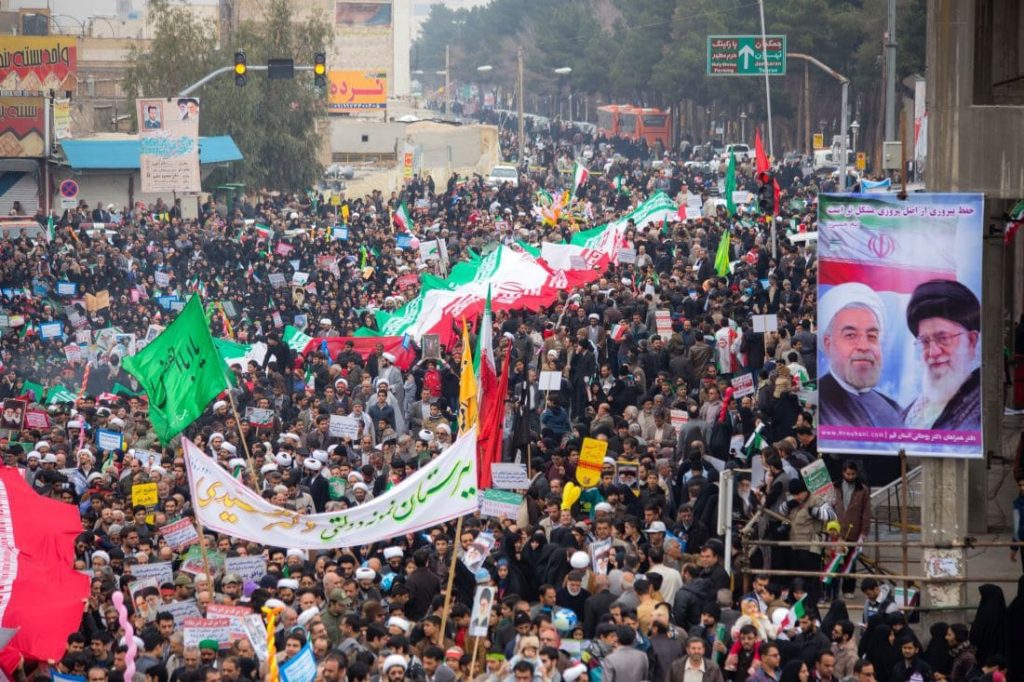
Why is Iran escalating its threats against Israel and the United States in recent days? The aggressive posture likely signals growing distress as the regime feels increasingly trapped and powerless. Iranian officials will have to find quick answers in the coming days and weeks to some pressing strategic problems.
A senior Iranian commander warned this week that Iran will “destroy” Israel, America and Saudi Arabia. Hossein Salami, who heads Iran’s Revolutionary Guard Corps, accused the three countries of stoking widespread protests against the regime.
Iran has shown patience to “hostile moves” by the US and its allies, Salami told a pro-government rally on Monday. “But we will destroy them if they cross our red lines,” he warned.
Salami later threatened to “take revenge” against Western powers “and their mercenaries inside Iran,” official news agency IRNA reported.
Iran may aim to deter its enemies with these exaggerated threats, but such rhetoric cannot mask the current crisis faced by the Islamic Republic. Below are three developments that are particularly alarming for the Iranian regime:
Ongoing Stalemate
Iran has made some belligerent moves across the Middle East in recent months, highlighted by the massive assault on Saudi oil installations. These and other incidents showcased Iran’s military capabilities, but ultimately failed to improve Iran’s precarious position.
US sanctions are still in place, and the Trump Administration is not showing any genuine interest in engaging with Tehran. Meanwhile, the economic crisis continues to deepen and is now aggravated by political unrest that could spiral out of control.
Iran is trying to play for time, in the hopes that President Donald Trump will be ousted in the 2020 election. But this is a risky strategy, as there is no assurance that Trump will not win again. In any case, the US election is still a long year away, and Iran’s domestic situation keeps worsening.
Moreover, Iran’s global image has taken a hit as more details emerge about the brutal repression of anti-regime protests. Western powers will therefore be even less eager to offer any gestures, at least in the short term.
Israel’s Toughness
Israel’s broad assault in Syria last week in response to a relatively minor rocket attack is a cause for concern in Iran. The IDF’s airstrikes targeted some key Iranian installations, but more importantly, sent a resounding message.
Israel signaled that it will not be deterred by the prospect of a major escalation or even war in countering Iran’s regional ambitions. Moreover, the IDF’s harsh retaliation made clear that it will not tolerate even limited attacks on Israel. What is Iran to do next?
The Iranians are reportedly planning a major strike on Israeli targets, but they are keenly aware that Israel’s response could be destructive. They also know that the IDF is on high alert, and that the Israeli army has been preparing for war for long months.
Given these circumstances, Iran must carefully consider whether it wishes to press ahead with its military plans. The cost could be very high, and any potential rewards are uncertain.
The American Threat
In recent weeks, some of the US military’s top commanders visited Israel for meetings with their IDF counterparts. This flurry of activity does not bode well for Iran. Details of the discussions were naturally kept confidential, but Iran was high on the agenda.
Meanwhile, a US general has warned about Iran’s continued aggression, as the US military continues to build up its forces in the region. Last week, aircraft carrier Abraham Lincoln sailed through the strategic Strait of Hormuz as a further reminder of America’s strike potential.
The US has so far shown restraint in the face of Iranian aggression, but Iran knows that this could quickly change, especially with Trump at the White House. Facing the combined military might of the US and Israel could carry devastating consequences, and this scenario further limits Iran’s options.
Officials in Iran now find themselves in a bind. Their military maneuvers thus far failed to achieve any tangible results, but further escalation could provoke a crushing response. This would combine with growing domestic troubles to produce a dangerous brew.
However, Iran cannot do nothing, as the status quo is not in its favor. Any signs of capitulation would also send a problematic message to allies and foes alike.
One option would be for Iran to apply more pressure while seeking to avoid a major military clash. For example, by staging attacks on Israeli targets beyond the region. Another route would be to adopt a somewhat softer stance in talks with the West, in the hopes of securing diplomatic achievements.
One way or another, Iranian officials must outline a careful strategy to deal with the current predicament. Alternately, hardliners could gain the upper hand and order a regional strike after all, to break the stalemate. Israel’s and America’s intelligence agencies are surely watching this closely.


